#to be united in a community by having the same poetry
Text
On one level the book is about the life of a woman who is hardly more than a token in a great epic poem, on another it’s about how history and context shape how we are seen, and the brief moment there is to act between the inescapable past and the unknowable future.
Perhaps to write Lavinia Le Guin had to live long enough to see her own early books read in a different context from the one where they were written, and to think about what that means.
-Jo Walton
#thinking of how her last four novels between 2004 and 2008 show a progressive blossoming of interest in classical literary traditions#following nearly half a century's worth of a career where she seems to actively avoid the influence of classical or medieval europe#idk. but i think this explains annals of the western shore as much as lavinia.#she gets so interested in what it means to share the same stories across space and time (and class and gender and nationality)#to be united in a community by having the same poetry#and in such an obvious way thinking about classics as a discipline is an incredible way to work through that#and i do think its an interest that must come out of having witnessed her own work unite people in community across time#if you're talking about the way stories and poems bring people together across time...#i read the texts passed on to me by renaissance humanists and 19th century philologists and byzantine monks and late antique scribes...#and they're the same across time and space but they're also not#and to have seen her own work reach people across space and time and be the same but also not... that must have been incredible#so: did living long enough to see her own early books read in a different context and to think about what that means#drive her to think about classical literature as she clearly was for the better part of a decade?#mine#reception#anyway i gotta think about this and email [redacted] tomorrow
28 notes
·
View notes
Text
canon things we know about the umbrella academy
luther used to marry viktor’s action figures at the age of eight
reginald used to watch the kids sleep and monitor their brainwaves
at some point, grace became ‘mom’ instead of ‘grace, the new nanny’ to all of the children
five was thirteen years old when he found his siblings’ bodies
klaus is the only umbrella native to the usa, coming from an amish community in pennsylvania; luther is from sweden, diego from mexico, allison from south africa, five from ireland, ben from south korea and viktor from russia
viktor cried when his siblings stepped on ants when they were children
the same kid hated oatmeal so much he killed minimum three nannies at the age of four
klaus broke his jaw when they were twelve after falling down the stairs wearing grace’s heels, and had to have it wired shut for eight weeks
grace helped the children pick out their own names
viktor realised he was trans after falling in love with sissy in the sixties
diego boxes under his comic book superhero name, the kraken, and in claire’s bedtime stories, allison calls luther his, spaceboy
diego’s preferred form of conflict resolution is a dance battle
hargreeves considered ben ‘easily manipulated’
both klaus and luther got kidnapped without any other members of their family noticing
after ben died, his family remembered him as the best of them who could do no wrong; klaus, who spent everyday with him, more accurately described him as a ‘loveable asshole’. all of them remember him as loving his family fiercely, and being the glue that kept them together
allison starred in a movie with sandra bullock
with viktor speaking russian, diego speaking spanish and ben speaking korean, it’s highly likely that hargreeves made a point to have them learn the languages their birth mothers spoke
reginald forced all the kids to read shakespeare, the odyssey in ancient greek and insisted on ballroom dancing lessons
sometime between season 1 and season 2, klaus learned how to drive
allison speaks seven languages, and five knows both ancient greek and italian
grace helped diego with his stutter
before he travelled back in time and met dave, klaus’ longest relationship was two-weeks long and primarily because he was tired of sleeping rough
ben and diego made allison’s teddy say ‘luther smells dad’s underwear’ as kids
diego told klaus that licking a battery would give him pubes when they were eight, and klaus believed him
klaus’ special training in the mausoleum was meant to make him too afraid of the ghosts to function, so reginald could control him better; reginald also killed him there at age thirteen, and possibly earlier
viktor’s violin once belonged to reginald’s late wife
diego’s ‘vigilante shit’ was a trauma response
allison was the first of the umbrellas to become a parent, and diego will be the second
ben almost certainly knew that klaus was dying and reanimating, as they spent sixteen years together after his death, and apparently never mentioned it
ben died at sixteen, and stuck around as a ghost for a further sixteen years before going into the light
it was a rule that nobody could speak at mealtimes, and they had to listen to various lectures on the radio
the children got half an hour on sundays for fun and games
the kids used to sneak out of the academy to go and get donuts at griddy’s
five used to get five stars in all of his performance reviews, although luther, hargreeves’ apparent favourite, did not
diego considered viktor’s book unforgiveable, but forgave him for ending the world in 1963 after he apologised
klaus has died fifty-six times by the age of thirty-two
ben died in something called ‘the jennifer incident’, although we still don’t know what it was or exactly how he died
luther spent four years alone on the moon; solitary confinement is considered torture by the united nations after fifteen days
luther wrote poetry on the moon, and self-harmed
diego has a fear of needles
klaus is now physically the oldest sibling, whilst five is mentally the oldest
allison rumoured either luther or patrick to love her
reginald told the kids at ben’s funeral that it was their fault he was dead
diego and klaus used to huff paint as teenagers
five spent somewhere between forty and forty-four years in the apocalypse; his contract with the commission was for five years, and we know he broke it before it was complete
as an old man, five had a moustache
luther, five and klaus all have problems with substance abuse
five and viktor were best friends growing up, as were allison and luther
luther got allison a locket with ‘A + L’ engraved on it when they were teenagers
allison rumoured herself onto a soccer team at one point, despite being homeschooled
luther wanted to go to summer camp, but reginald told him he would never go
none of his siblings know that diego shut grace down in season 1
five singlehandedly invented the formula for time travel
luther fell for the nigerian prince scam
#tua#tua spoilers#im making this more for myself and my own reference than anything (fic writing) but i thought it'd be interesting to share as well#luther hargreeves#diego hargreeves#allison hargreeves#klaus hargreeves#number five#ben hargreeves#viktor hargreeves#reginald hargreeves#grace hargreeves#i know these are all out of order but im writing them as i remember them#ref
2K notes
·
View notes
Text
Bonus OC Intro Penetinos
Hello everyone! Originally I had planned to share an excerpt about the relationship of the pirates Dati and Istek for Valentines Day. However looking through my feed, I was struck by just how many of the people I follow are arospec. As such I decided that it might be appropriate to introduce y'all to my OC, Penetinos who is AroAce. I had originally intended to include him in the first poll but I didn't have time to make his portrait.
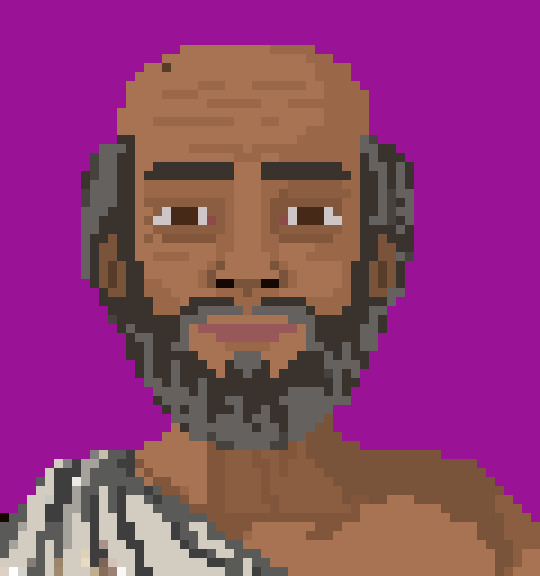
Without further ado! Penetinos "The Sage"
Name: Penetinos
The name Penetinos is among the most common in the southern Korithian isles, originating from the Arkodian word Penetiwanos, the exact meaning of the name is unclear though it is likely a reference to some variety of songbird
Intro continues below the cut!
Family
Father: Chalados, Scholar, Commoner (Dead)
Mother: Ladolia, Priestess, Commoner (Dead)
Siblings:
Daocoon (M, Living, Half-brother)
Homeland/Place of Origin
The City of Obfunemakolis, on the island of Obfunema
Ethnicity
Arkoteki Korithian, the Arkoteki are culturally and ethnically the closest descendants of the Korithian precursor civilization, the Arkodians. The Arkodians, famous for their creation of magical weapons made from Arkodian Bronze, were ultimately destroyed during the Kishic-Arkodian War, the same war which would ultimately lead to the collapse of the United Kishic Empire.

History
Penetinos was born 59 years before the events of the story as the result of an affair between the scholar Chalados, and the priestess of the goddess Fokisa.
Though Chalados was married, and already had a son, the scholar did elect to adopt his bastard son.
From a very young age, Penetinos was tutored in the language and scripts of three languages, those being Korithian, Kishic, and Apunic. At this he excelled, and became a star pupil among the academics and scholars of the city and temple district.
He even took up the mantle of tutor, educating the elite youth of the city, and of nearby islands in the ways of poetry and natural philosophy.
Penetinos was never made aware of his mother's true identity until shortly after her death. The shock of this revelation had two primary results, the first being Penetinos' choice to become a priest in his mother's order, and the second and more crucial being the awakening of his latent sagecraft.
Upon finding that he was able to see and converse with spirits, Penetinos buried himself in his studies, honing his skills and becoming a talented, if not particularly powerful sage.
Unfortunately it was well communing with one of these spirits that Penetinos would be made aware of the ultimately fatal disease with which he was inflicted.
What followed was several years of desperate study to try and find a way to cure or stop the disease. When all mundane treatments proved fruitless, he turned to magic, though unfortunately this too would prove to be futile.
Penetinos fell into a deep depression, leaving the priesthood and locking himself in his home.
When this depression gave way, he turned to a frantic desire to "live life to its fullest." Under the advice of his half-brother he turned to gambling, wine, and brothels. However to his frustation he found that these things held no interest to him. Despite his brother's ultimately well-intentioned attempts to find Penetinos a partner to care for them, Penetinos found himself repulsed by of sexual intamacy, and ultimately uninterested in romantic partnerships.
Rather than finding meaning in these things, Penetinos turned his attention to what he had always done best, his studies. Penetinos chose to devote his life, however long it may be to his research.
Bidding his home city good bye, he journeyed from city to city, studying and gathering knowledge. Knosh, Baalkes, Apuna, and finally the Kishic city of Chibal.
Appearance
Penetinos's sickness and his sagecraft have caused him to age prematurely. His back is bent, his once light brown hair is now grey and silver. In his youth, Penetinos was noted for his handsome and youthful appearance, tall and thin. Now unfortunately, it would be quite easy to mistake him for a man twenty years his senior.
The terminus of his sickness is unclear, for all he knows he could die from some other malady or accident before it runs its course.
Personality
Despite his appearance, Penetinos has lost known of his intelligence, and is quite often the smartest person in the room. His attitude can be best described as professorial, stern at times, quiet, though ultimately kind. Penetinos is a gentle person, averse to violence, and easily enthused when it comes to learning new things.
He has come to accept his mortality, and will readily discuss the subject of death with just about anyone.
He is eager for new experiences.
Gender/Pronouns
Cis-man He/Him
Sexual Orientation
AroAce
Relationships
Penetinos's tendancy to move regularly and his orientation mean that he has few relationships, though he has made friends in several parts of the Green Sea. At the current moment he is closest to the slave, Shela.
Favorite Color
Yellow
Favorite Food
Bread dipped in wine
Biggest Fear
Formerly death, now the feeling of ultimately being useless
Sage?
Yes
Literate?
Can read and write in Kishic, Korithian, Knoshic, and Apunian.
An Excerpt
Penetinos was among the less than spectacular kind of sage. In fact, Suru had hardly ever seen him use magic. It was impossible to divine his age, as with many of the others; his hair was silver, his back bent, his face wrinkled. For all Suru knew, he could have been in his seventies or only in his forties. It was so hard to tell with these sages. By all measures, Penetinos was a kind man, soft-spoken. Aside from new scrolls, he rarely asked for anything. He read on an eclectic array of topics; today, his topic of interest was magical plants and fungi.
The sage attempted to roll out a scroll, an old Ikopeshi description and illustration of a certain magical algae. Try as he might, his quaking fingers could not hold the brittle paper, and each time he bent to decipher the words, the scroll would quickly snap back to its rolled position.
“Suru? I don’t mean to disturb you.”
Suru grunted and opened his eyes. “I’m sorry, sir. Is there something you need? I think Otilia and Shela are still gathering the other texts you requested.”
“No, no, that’s quite alright, I might have asked for more than I needed as is, I worry. I need you to hold this scroll open for me while I read. Ridiculous, I know, but-” He held up his hands and smiled apologetically.
“Of course.”
“Thank you.”
The scroll now safely secured, Penetinos leaned forward and began to read, mouthing the words to himself.
Suru glanced down at the painting. It showed a cluster of vibrant purple seaweed. It was unlike any plant Suru had ever seen.
“Is it really that color?” He asked.
“Oh, this? Yes, of course. In your tongue, it is called Asburichibikur.”
“Is it magical?”
“Very. If you eat it plain without drying, it will trick the mind and make you see things. And if it is dried, it provides those people like you, those who lack the sight, the ability to see spirits for some short time. It has many other uses as well, of course, but I doubt that you want to hear me ramble on about that.”
@patternwelded-quill @flaneurarbiter @skyderman @blackblooms @roach-pizza @illarian-rambling @dezerex @theocticscribe @axl-ul, @persnickety-peahen
Bonus character for y'all!
#writeblr#writing#wip#worldbuilding#fantasy#fantasy writing#queer fantasy#world building#aroace oc#asexual fantasy#pixel art#fantasy world#testamentsofthegreensea#aroace
22 notes
·
View notes
Text
Transiting Mercury enters Pisces
Friday, February 23 - Sunday, March 10, 2024
Seventeen days for us to get our “right brains” into action - moving away from material precision and exactness, into a space/time where everything exists and nothing is real.
This isn’t Mercury’s favorite place to be - Pisces opposes Virgo, one of Mercury’s signs, and squares Gemini, Mercury’s other sign. Merc likes its cold hard facts! It’s Pisces, though, that picks up on the nuances and subtleties. And we need that ability as much as we need logical facts.
Learning - it’s a great time for the poetry unit in “language arts” class. Our imaginations really have to be engaged, for us to want to learn.
Thinking and reasoning - nonlinear. The process is more important than the end result. We can be a little muddled and foggy here; set aside some quiet time and meditate.
Communication - can be vague and noncommittal; can be poetic and compassionate. Makes it easy to lie, alas. Keep to the high road.
Since Mercury is wafting right along, speeding through the skies, these aspects are valid pretty much only on the day they happen.
Sunday, February 25 - Mercury/Pisces square Pallas Athene/Sagittarius, 4°57’. Words fail us? We aren’t as clever as we thought we were; we have trouble thinking things through (if we even bother with that).
Monday, February 26 - Mercury/Pisces sextile Ceres/Capricorn, 6°44’. And the problem seems to clear up. Perhaps a wise old grandparent set us straight? Our ideas can manifest easily.
Wednesday, February 28:
Mercury/Pisces conjunct Sun/Pisces, 9°14’
Mercury/Pisces conjunct Saturn/Pisces, 9°44’
This is a big deal: the Superior Conjunction between Mercury and the Sun, marking the halfway point of their cycle. And Saturn is parked in the same degree! We’re serious-minded and much more likely to use past patterns to guide us.
Thursday, February 29 - Mercury/Pisces sextile Jupiter/Taurus, 11°12’. A lucky opportunity to manifest our ideas. Might make us a little lazy, intellectually.
Friday, March 1 - Mercury/Pisces opposite Juno Rx/Virgo, 14°06’. Not being on the same mental wavelength as our partner. Maybe not wanting to be there, too. Not very favorable for being heard.
Monday, March 4 - Mercury/Pisces sextile Uranus/Taurus, 19°41’. More brilliant, practical ideas. Teaming up with like-minded pals could be very profitable.
Wednesday, March 6 - Mercury/Pisces square Vesta/Gemini, 24°21’. Vagueness and fuzziness of thought; inability to concentrate. Like having four possible forks in the road and not knowing which one to take. (Four - two Pisces fish plus two Gemini twins.)
Friday, March 8 - Mercury/Pisces conjunct Neptune/Pisces, 27°01’. The fog continues to roll in. If we’re used to Mercury-Neptune energy this can be an inspired, prophetic, poetic time. If you’re not (raises hand), it’s best to stall on making any important decisions until the fog lifts.
And a heads up: Mercury enters Aries on Sunday, March 10, and thanks to retrograde won’t exit Aries until May 15. Gonna get loud.
18 notes
·
View notes
Text
Bengiyo's Queer Cinema Syllabus
For those who are not aware, I have decided to run the gauntlet of @bengiyo’s Queer Cinema Syllabus and have officially started Unit 2: Race, Disability, and Class. The films in Unit 2 are: The Way He Looks (2014), Being 17 (2016), Naz and Maalik (2015), The Obituary of Tunde Johnson (2019), Margarita With a Straw (2014), My Beautiful Laundrette (1985), Brother to Brother (2004), and Beautiful Thing (1996)
Today I will be writing about
The Obituary of Tunde Johnson (2019) dir. Ali LeRoi
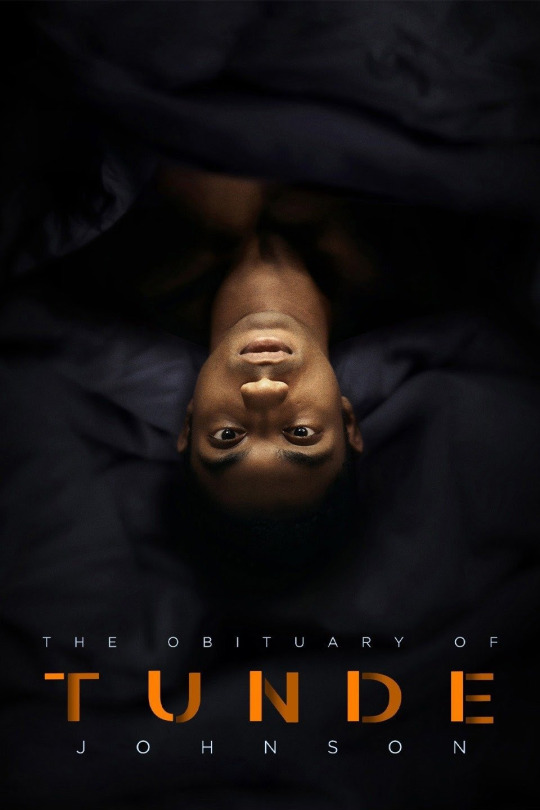
[Available on Amazon and Hulu, Run Time- 1:44, Language: English]
Summary: A wealthy Nigerian-American is pulled over by police, shot to death, and immediately awakens, reliving the same day over and over, trapped in a terrifying time loop- forced to confront difficult truths about his life and himself.
Cast:
* Steven Silver as Tunde Johnson
* Spencer Neville as Soren O’Connor
*Nicola Peltz as Marley Meyers
___

I will tell you right now, this was one hell of a watch. It never lets you forget, from the very first second, how much of a tragedy this film is going to give you. God, I don’t even know what to say about this film. It is beautiful, it is poetry, it is horrifying, it is tragic, and real. This is a film I think a good majority of people should see. I don’t know if you all know this about me, but I am a slut for beautiful prose (it’s why Frankenstein is one of my favorite books) and The Obituary of Tunde Johnson delivers line after line of the most beautiful and devastating kind.
One thing that I want to mention, because it just speaks to the absolute predictability and unfortunate reality of how often Black people are murdered by police, is that The Obituary of Tunde Johnson was released in 2019. But they set it in the future, according to @bengiyo, because they thought the film wouldn’t get released until 2020. The thing that was absolutely chilling about that choice, is not the year, but the date that was selected.
“Babatunde Adesola Johnson was born on September 30th, 2002 to Adesola Johnson and Yomi Okafor in Lagos, Nigeria. On the night of May 28th, 2020, Tunde Johnson departed this life at 9:38pm in Los Angeles, California”
Because, George Floyd was murdered on May 25th, 2020.
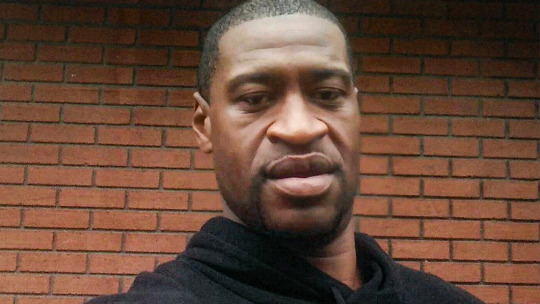
They couldn’t have known that, and it is so entirely possible that any day they had chosen would coincide with another tragic and preventable loss. But the weight of the first sentence of this film alone struck me. Because the premise of this film is that Tunde Johnson is stuck in a time loop where he is killed by police before the night is over. Tunde is the vessel by which repeated violent racism and genocide against the Black Community is committed over and over and over and over, in an endless, exhausting cycle. So it is a coincidence, but a sobering one to realize that Tunde died around with Mr. Floyd would have, and made me wonder whether or not his name would be forgotten.
But secondarily, they chose Los Angeles as the setting for his first death. Which gave me pause because the only thing I could think about when I heard that was whether or not it was an intentional call to the LA Riots of 1992 which (for those who are not familiar with US history) began as a result of four police officers being acquitted on charges of using excessive force in the arrest of a man named Rodney King.
9:37 pm on July 6, 2016 is when Philando Castile died from the wounds he suffered at the hands of police.
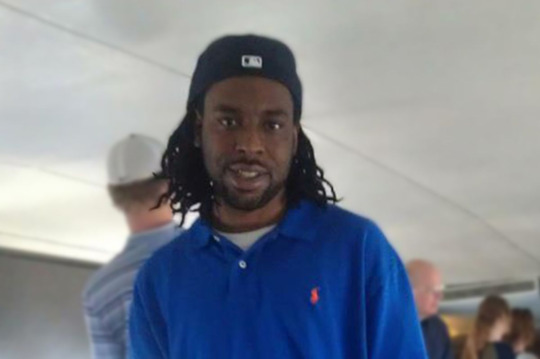
It is hard for me to figure out what to talk about with this film because more than anything it gave me pause, it left me speechless and contemplative about their messaging. So, let me give you some lines:
“I’m having really abstract ideas. Colors, hues, my next photo series. Something…something like, deconstruction. A young African American male, or Black masculinity….I just keep seeing red,”
“We love you unconditionally. I want you to know. I want you to know that, to understand that, with unconditional love comes unconditional fear.”
“I will no longer die. I have become 200 hills rolled in to one. I am immovable.”
“I’m Black and gay, and even those two hate each other. Which means,like in the eyes of humanity, i’m like wo degrees off human. Something to be feared and laughed at, like this curiosity in the corner. I should be happier though, right? Dr. Martinez? Cause I”m one of the lucky ones, like I got a nice car, and a big house. All this stuff, supposed to make me feel like I’m worth something. People walk right through me, Dr. Martinez. No one sees me. Except him. Soren sees all of me. And if he can do that, then he can do anything.”

Like these are just beautiful, tragic words, each one carrying significant weight.
My warning to those of you who may watch this (and again, I think most everyone should watch this) is that you will see repeated acts of violence done to a Black teen (or in this case a 30 year old actor playing an 18 year old). [And I will be talking with some details about those deaths from here] And part of what is striking about that is that the way we see him die changes every time. The first time Tunde Johnson dies, we are in his point of view, he is pulled aside for a traffic stop, and shot when he turns to talk to an officer, with his hand in his pocket and gets struck twice in the chest, one officer yelling “gun!” [he did not have a gun]. The second time Tunde Johnson dies, he is killed the same way, pulled over at 9:38pm, and shot when he turns around, but this time, we see it through the cop car’s dash cam. I think “I wonder if the solution to surviving the evening is having a white person in the car with him so the officers behave themselves” which was then immediately undermined when Tunde was shot in the driver’s side of a parked car, and shot by two white female police officers while his wealthy, white boyfriend Soren livestreams the cops to try to hold them accountable I guess?
Crucially, this white boy escalates the situation with the police officers because he can talk back to them and be safe, and the police get aggressive, tell Tunde not to move and to step out of the car (you know, don’t move to unbuckle your seatbelt, but step out of the car) and fire multiple shots at him at point blank range. We see this happen through the livestream.
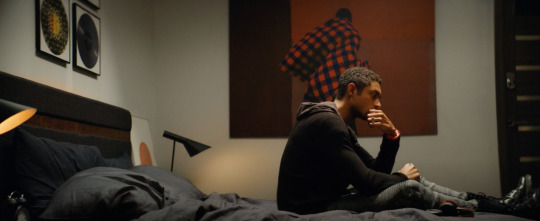
His next death happens via the image of a 911 operator phone call transcript, you hear the gun go off in the background of the call. Tunde wakes up for the umpteenth time in the time loop, calls his boyfriend multiple times because he’s feeling like he’s losing his mind, and Soren doesn’t answer for hours, so Tunde is mad. And Tunde goes to school mad, and Tunde brushes past the front office at the school he goes to and should be known at and starts walking the halls, escalated. He sees his boyfriend fucking his girlfriend, gets mad, gets in a small fight with the two of them, and is shot in the hallway with his hands up while the two white people are completely fine, safe, and sobbing over the dead body of their friend. The lead up to that we see Tunde through the school’s CCTV screens.
So, up through now the deaths we have seen have been quick in all accounts, one movement from Tunde sends the officers shooting, he drops to the ground, and then he wakes up gasping. Over and over, and over and then…the last time Tunde Johnson dies, we see the scene first through the window of a gas station. The famous, wealthy white man walks away for one minute, and Tunde is being brutalized, and he dies by being suffocated, trying to tell the police officer ‘I can’t breathe” but not being able to complete the sentence. I would have to go back to time that scene, and I am not going to do that because one time watching this kid die was enough, and the entire time he’s choking they stay zoomed in on his face, to time it to see if it is referencing any particular death by choking case of police brutality (I’m thinking very much of Eric Garner here). [To here]
(if you skipped any of that, or in general just to summarize, Tunde's deaths are recording: in his POV, by dash cam, by live stream, by security camera, by 9-1-1 call transcript, and in extreme close up)
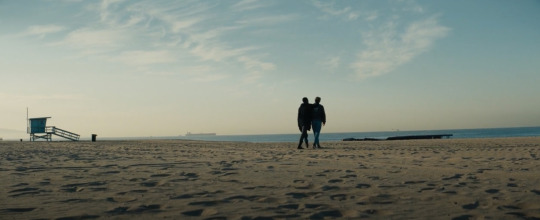
I like that Tunde wakes up after this final death, he says “I will no longer die. I have become 200 hills rolled in to one. I am immovable.” and that in speaking those words, he has made them true. There is so much obvious genius in this film, the cinematography is beautiful. I love the way they keep adding details to the time loop to make each experience different, and that those differences start out miniscule, and change almost entirely the more times he dies. I love that Tunde finally seeing that his best friend since childhood, Marley, who is white will turn against him in an instant the second that he hurts her. I love that Tunde survives the night when he finally stops letting himself settle for the way Soren (also white) has been treating him. When he finally has enough with letting Soren not only deny their relationship, but to fuck someone else to keep up appearances. I like that we get enough of a backstory on Tunde to understand some things about him, but a small amount that makes us realize that he has a lot of other things in his past that are informing how he alks about through life right now. I like that it feels like Tunde is lived in, like he is a person, with a history, and that at any point we could ask the writers, the actor, or whoever about Tunde Johnson’s likes or interests, or his best or worst memory, and they would have an answer for you.
This film will sit with me for awhile, that’s for sure.
By/For/About

For and About Queers. I would say that this is a tricker one for me because there are some heavy handed messages in this show about like, white privilege and all that, that makes me feel like it is being written for people who do not hold the identities in the film, so I would be inclined to say it was mostly just About Queers, BUT I think that there are specific groups of queer people for whom this film may strongly be made for them. I do think this film does an incredible job of maintaining and reminding the audience of Tunde’s queerness, because there is a history of police brutality and queerness that cannot be forgotten, and by having Tunde be both Black and queer, there is literally no part of himself he can protect from police violence.
Favorite Moment
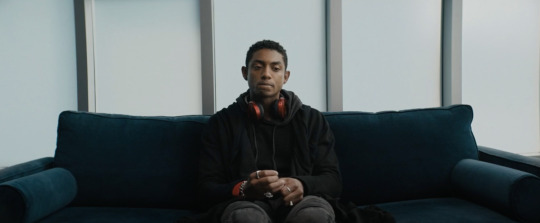
My favorite moment is Tunge’s monologue about being Black and gay. It was so beautifully performed, the words were so powerful, the way Tunde’s white or white-passing, female psychiatrist was reacting to the realizations of why Tunde exists the way he does. And I like the subtle messaging we get as a result of that, understanding that yay, it’s great that Tunde or his parents put some value on mental health, but how beneficial is Tunde’s treatment going to be if his psychiatrist holds literally 0 of the identities that he does?
Favorite Line
The last line of the film.
“On March 28, 2020 Tunde Johnson survived.”
I don’t think I realized how much I was holding my breath throughout this film until I heard those words aloud.
Score
10/10
P.S. it is reallllyyyy fucking telling about how people have engaged with this film when 95% of the things I saw in the tags for this film when I was looking for gifs are of Marley and Soren, the two white people, or Soren and Tunde together when part of Tunde's entire arc is shedding that dead weight.
photos from @kilimiria
Next up: margarita with a straw
29 notes
·
View notes
Text

Tuesday, March 5, 2024
A fairly simple study day. There was a lot of reading and several lecture videos and a geometry review from the first quarter. I haven't looked, but I'm guessing tomorrow is probably a second quarter review.
Also, this may sound strange, but I have always known that I have grown up in a fairly wealthy family, but our home, which is worth more than I feel comfortable putting on an online blog, has always just been home to me. I never thought about it too much. Then I had to do this floor plan for Spanish to practice vocabulary words, and I realized that I didn't even know all the Spanish words to use for the different rooms of my home. I also realized that the assignment only asked to name six rooms, and we have more than that on the first floor, not to mention the ground floor and the upstairs. So I only drew the first floor, which is the floor people walk in on. The house was built on a hilltop, so the first floor is a ground floor AND a second level at the same time. Anyway, I felt bad how I had never really thought about my living situation before. Of course I have always been grateful to have a home and to live in the area of the city that we do, but thinking about all the extras my home has that generally most middle and working class homes don't, I felt a lot of shame in it.
My parents always taught me humility and to give back to the world, but it seems terribly extortionate to live by the means I have available to me. Please tell me I am not having some sort of existential crisis triggered by a Spanish assignment. I think I will talk to my parents about this. I need to finish eating so I can be ready for ballet.
Tasks Completed:
Geometry - Review of first quarter topics
Lit and Comp II - Reviewed Unit 20 vocabulary + read chapter 34 of Emma by Jane Austen + submitted poetry notebook project to Mom for grading (100/105 because I could have been more clear on poem interpretations)
Spanish 2 - Drew the first floor floorplan of my house + labeled the rooms in Spanish + wrote sentences about my house in Spanish
Bible I - Read Judges 5
World History - Watched a video on US Marines at Belleau Wood + watched a video about US Army battles in France + read several different WWI topics and documents
Biology with Lab - Read an article about evolution creating a new species in the Galapagos Islands + read more on natural selection + read about genetics and evolution
Foundations - Read the definition of reverence + completed next quiz on Read Theory + read about if propaganda is always negative
Piano - 60-minute piano lesson + practiced for one hour
Khan Academy - Completed World History Unit 6: Lesson 2
CLEP - Completed Module 10.2 lecture video
Duolingo - Studied for 15 minutes (Spanish, French, Chinese) + completed daily quests
Reading - Read pages 185-208 of Nigeria Jones by Ibi Zoboi
Chores - Laundry
Activities of the Day:
Personal Bible Study (2 Samuel 22)
Ballet
Pointe
Journal/Mindfulness
-
What I’m Grateful for Today:
I am grateful (and blessed) to live in a beautiful home in a gated community where I feel extremely safe.
Quote of the Day:
Being classy is my teenage rebellion.
-Rebecca McKinsey
🎧Waltz in B minor, Op. 18, No. 6, D145 - Franz Schubert
#study community#study blog#study inspiration#study motivation#studyblr#studyblr community#study-with-aura
16 notes
·
View notes
Text
Dead Poets Society Blog Essay
By: Jillian Arnold
A quote from Mr. Keating, “We don't read and write poetry because it's cute. We read and write poetry because we are members of the human race. And the human race is filled with passion.”
youtube
I first watched Dead Poets Society when I was sixteen years old for my sophomore year English class. My assignment was to find a monologue to memorize and record myself presenting it, as it was COVID during the time. As I was searching for speeches, I came upon one by Robin Williams and since he was in many movies from my childhood I thought, why not look into it? I chose that speech for the project and decided to watch the movie to get to know the speech better. I ended up loving the movie and it changed my life with its outlook on life and movement to seize the day. Unknowingly, I was the same age as the boys I connected with and would continue to grow with them as they remained the same age.
Dead Poets Society was released into theatre on June 2nd, 1989, and was both a critical and commercial success. The movie earned $95,860,116 domestically and $235,860,116 worldwide, making it the fifth highest-grossing movie of the year when it only had a $16,000,000 budget.
youtube
During the release of this movie in 1989, George H. W. Bush was sworn in to become the 41st President of the United States.

I was not the only person affected by Robin Williams’s powerful speech in this movie. It was well-received by audiences, scoring 92% on rotten tomatoes. This movie appealed to the audience with its message of carpe diem or to “seize the day.” According to Dead Poets Society: A Summary by Faith Lord, “The story portrays a teacher named Mr. Keating who has come to an all-boys school that is steeped in tradition with boys who are expected to follow the rigid and unyielding expectations of their parents regarding their education. Keating's unconventional methods use poetry to help the boys regard their identity and desire with his lessons from literature and poetry.” This intended message reached out to the people who are stuck in a cycle doing meaningless things to them and to be an independent man who seizes the day and don’t let their life fly by them. The producers relied on reaching their audiences to have them connect with the film. They didn’t need big action scenes or a love story to touch people’s hearts. Another appeal to the audience was the famous actor Robin Williams, who starred as Mr. Keating in the film. As a beloved actor at the time, his improv and humor brought people happiness and made them laugh at previous films, making people want to see his role in this film.
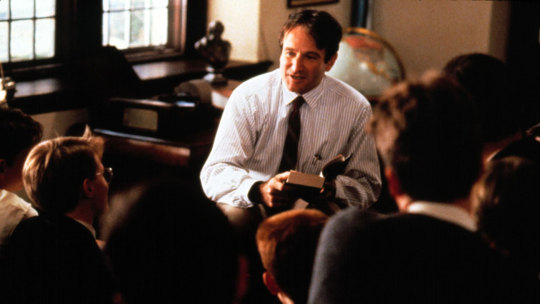
The film does have some problematic elements for viewers that stirred some controversy when the film was released. The first is its outlook on suicide. Near the film's end, the character Neil Perry is forced to withdraw from his beloved school to military school and has to quit theatre, which was his newfound love. His last act was putting on his thorned crown from A Midsummer Night’s Dream before shooting himself. This suicide could’ve been seen as his last rebellion and could be praised biblically, but that may not be the case for all viewers. This glorification of suicide can cause more harm than good since suicide is the second leading cause of death for people. Another problematic topic could be the film’s issue with queer baiting. Although this may have not been an issue when the movie was released to today’s viewers, it may be a more current issue. There is a heavily alluded LGBTQ relationship between Neil and Todd in the film but there is no confirmation. This baiting takes away from the representation of a minority and can take a toll on the viewers in the community since they don’t see themselves reflected in films very often.

This movie is an unconventional movie with its deeper meanings and its non-blockbuster-type plot. The plot of this story isn’t conventional and doesn’t have an outlined story, rather it follows the ups and downs of boyhood and their struggle to break free from the status quo.
I chose this movie to write about for the first assignment of the class because it was a movie that stuck out to me growing up and I knew I would be passionate to write about it for this assignment.
When I first watched this movie, I didn’t see its problematic themes, I just loved the poetry and the outlook on life. After watching it this week and doing research on it, I understood its themes and why there were problematic topics. I never knew when I first watched it that it was such a huge film and is famous, but now that I’ve rewatched it I know that it is. Overall though, I still really enjoy this movie and it’s a go-to watch every time. I love the characters and see myself in them and can find solace in them. I have taken the movie’s main message, “seize the day,” and it has allowed me to find the things I love right now. If I hadn’t taken that step and seized my day, I wouldn’t have joined my love of theatre nor taken the time to figure out what I wanted to do with my life. Finally, a quote from the movie, “The powerful play goes on and you may contribute a verse. What will your verse be?”
8 notes
·
View notes
Text
𝓒𝓗. 𝓥 — [𓂧𓁷𓏏] (‘𝓭𝓗𝓻𝓽’ | 𝓫𝓲𝓽𝓽𝓮𝓻𝓷𝓮𝓼𝓼)
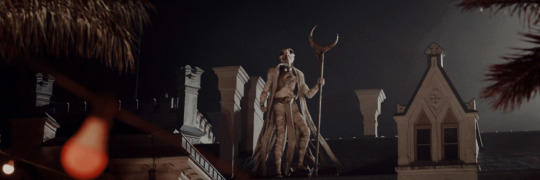
𝐂𝐇. 𝐕 𝐨𝐟 𝐏𝐑𝐎𝐌𝐈𝐒𝐄𝐒 𝐊𝐄𝐏𝐓.
[𝓪𝓼𝓲𝓶𝓹𝓵𝓮𝓪𝓻𝓬𝓱𝓲𝓿𝓲𝓼𝓽'𝓼 𝓶𝓪𝓼𝓽𝓮𝓻𝓵𝓲𝓼𝓽]
[ 𝐌𝐎𝐎𝐍 𝐊𝐍𝐈𝐆𝐇𝐓 𝐌𝐀𝐒𝐓𝐄𝐑𝐏𝐎𝐒𝐓 ]
AO3 | SPOTIFY | PINTEREST
summary ☾
⤏ khonshu knows, logically, that your shared arrangement will not last forever—it cannot. such is the nature of humanity, to change on a whim. he realizes, however, that it is difficult to face.
⤏ an unexpected boon granted from the child he’d blessed makes that concept complicated still.
pairing ☽ khonshu/singlemom!avatar!reader
word count ☾ 11.0k
a/n ☽ [header credit]
⤏ this is one of those chapters that I struggled with greatly, if the length of time between updates is any indication. the first scene spilled forth effortlessly. the rest of it? like prying teeth. i am not one to utilize time skips to help with progressing plot because i feel it is over (and so often poorly) done, but due to the nature of this fic and its (admittedly loose) timeline in my mind, i will have to work out of my comfort zone and let it slide more than keep it rigid. hopefully the end result is halfway smooth. my apologies that it took so long—y’all’s comments really kept poking my conscience to get me going again. please enjoy! :)
☽ MASTERPOST ☾
☾ PREVIOUS CHAPTER ⤎ ☥ ⤏ NEXT CHAPTER ☽

Human courtship rituals had never made sense in ancient history, and they certainly didn't in the present day—even less so, perhaps.
What one culture might have found offensive, another regarded it as a necessity. Taboos and essentials abounded without any sense of rationality, nor any modicum of moderation. Such social constructs appeared difficult enough to navigate without accounting for the fickle natures of mortals with their own individual preferences. Everyone had a 'type', and everyone expected a certain list of behaviors to be demonstrated by suitors of that type—often without communicating such needs to their partner, expecting them to intrinsically know what to do, and when or how to do it.
The entire ordeal always seemed pointless to Khonshu. At the end of the process, no matter how varied, the result was the same: the humans copulated, and most produced children as a result of the union. Many realized that their partner was not as appealing as once anticipated or chose to deceive them, so splits in family units were common—though so much more in the past couple of centuries than ever before. Children were always torn in the tumult that such division wrought despite its necessity at times.
Khonshu had observed it time and again, this so-called "love" about which humans waxed so wistfully in endless records of poetry and songs and art, frequently the perpetrator of heartache and sorrow and war. It blinded and leached and crumbled anyone and anything it touched. Once he was called upon by new couples for assistance in starting families, to heal their loved ones or children, or to protect a traveling husband and father while journeying back to his home throughout the night. That alone wearied him, dealing with the outer echelons of matrimony and the like—he had never understood how his kin could deal so intimately in the very heart of those matters, as messy and complicated as such feelings grew to be, without feeling exhausted at all times.
Love wasn't simple. Love had layers and contexts and depths that Khonshu didn't care to traverse. It had no concrete definition, no factual basis. It was not his specialty by any means. The judgment and execution of justice had been his closest companion for over a millenia, and it was all he needed.
His proximity to the greatest folly of humanity had narrowed significantly, once he'd reduced his influence. Even still, countless avatars under his auspices had been inflicted by romantic inclination, often resulting in him having to turn them loose to pursue it to its fullest. A mortal with no one for whom to live was a useful implement, lacking attachment—a mortal devoted to another, and to those they may create, was always harder to hone and utilize. Past experience dictated that it was better to cut ties and seek out another mortal more suited to the role he would give them.
He knew it would be better to leave you now, before the turmoil of conflicting interests set in...but he couldn't quite fathom bringing himself to do so.
Khonshu sat wordlessly within a tall windowsill of a bleak, gray brick office building across the street from the multi-level, upper-class restaurant to which your unannounced courter had brought you, arms coiled around his folded knees with his staff gripped tightly in his hands against his shins. The cold winds, acquiescent to his dour mood, whipped through the street below, snarling and biting with frigid teeth at the tails of his tattered cloak. The humans milling about hunkered into their coats and scarves to stave off their shivers, but Khonshu remained deathly still as he peered through the broad glass windows spilling sultry golden light onto the glistening pavement. The gentleman had chosen a small booth flush with the view into the narrow stone garden lining the sidewalk, sitting across from you and leaning attentively forward as you chattered on with a smile. He had driven his vehicle with caution and had opened the doors of both his car and the building for you. You were clearly charmed, fingers coiled around the stem of your glass of wine, eyelashes cast low over your eyes, heart fluttering incessantly against the inside of your ribs—he could feel it as acutely as the odd, foreign tightness within his own chest.
Khonshu had followed from lamppost to banister to rooftop the entire drive into uptown London, withholding himself from your field of vision—you'd grown attuned to his presence while he remained in the astral realm (much to his chagrin), looking over your shoulder like a tense prey animal every time you sensed him near, but if he maintained a certain distance from you he seemed to be able to avoid your detection. He kept his magic as close as possible, folded carefully around himself in a shroud that would (hopefully) conceal him from your view.
Your "date" was a good-looking man, obviously wealthy, with a sincere interest in you—Khonshu could discern no evident wrongdoing in him, no lingering malice. You found him attractive, too, if your subconscious behaviors were any indication. Your clear apprehension had evaporated almost instantly with his disarming, genteel mannerisms. He would likely care for you, with ample room to spare for your child, given his experience with his own—he would unquestionably be able to see to your needs. After that man had ruined your marriage, you'd remained mostly independent, other than your reliance on Elizabeth—but Khonshu hadn't considered that you would potentially, eventually seek out another partner with whom to share your burdens.
Khonshu had no say in the matter. He knew, logically, that he should start seeking out another candidate to be his avatar. It was difficult enough for you to care for your son, maintain your occupation, and serve himself well into the wee hours of morning, all while maintaining your secret from your closest friend—entering a new relationship would be next to impossible to manage. He had favored you for far longer and had devoted more time and power to you than he had to any of his avatars in decades—the reason he'd chosen you to begin with was an unusual one, unconventional by the Ennead's standards. It was bound to unravel at some point. The sands of time would shift, and he would yet again be moving on to another human destined to dwindle away.
And yet...
Khonshu watched you head tilt with laughter, your hand rising to cover your mouth to stifle the noise. The gentleman's eyes shone as he watched, grinning from ear to ear. His fingertips brushed yours to the side of the small appetizer plate, ginger and shy. The boiling inferno brewing within the lunar god caused the ancient wood of his staff to creak dangerously under his unforgiving grip.
Khonshu hated getting involved in humans' personal affairs. He had given too much of himself away in the days of old attempting to garner dedication from his followers—oftentimes his efforts had been shortly forgotten, their faith and worship lost once their needs had been met. He owed them nothing, even if he relied upon them for what scant sustenance he gleaned from day to day—there was a reason that his kindred had all but abandoned humanity thousands of years ago. He ultimately owed you nothing, despite the unusual circumstances of him becoming intertwined into your life.
...And yet.
Khonshu continued to observe (to make sure you were truly safe, of course—it still was his job to protect you for the time being, after all, even if that time may have been unexpectedly cut shorter due to newly developing events). He watched the waitress bring out your entrees and refills for your drinks, watched you eat far more primly than you ever did in the comfort of your own home. The gentleman continued to prove himself responsible, at least—he opted for water after his first alcoholic beverage, since he was your chauffeur for the night. You did the same, for the sake of exercising caution.
Khonshu studied (not for the first time, though he wouldn't dare admit it to himself nor another soul) your features in the borderline otherworldly lighting: the glossy sheen of your hair framing your face, the curve of your cheek, the confident jut of your chin, the feathered, gossamer shadows cast by your lashes—all accented with a brazen splash from the interior of the restaurant against the heathery gloom seeping in through the window. Khonshu hadn't seen you dress in raiment any finer than your work uniforms or your loungewear, much less the soft pigments applied to your face, but you appeared rather fetching to the eye. The gentleman had definitely taken notice, if the frequent tugging at his buttoned collar was any indication.
Food consumed and water downed, the pair of you settled in over a dessert—two separate spoons delved into the same dish. Khonshu turned his attention to the man with a far more critical gaze, noting the tension in his shoulders paired with the tightness in the corner of his mouth. Where minutes before he'd been entirely invested in your company, now he tapped his foot incessantly against the tile beneath the table. Anxiety? Or anticipation?
Mid-bite, the gentleman stopped. He dropped his eyes to the tablecloth, set his spoon to the side, and murmured something that caused your expression to morph faintly into concern. You responded, offering him a small smile, and watched him as he folded the cloth napkin laid over his lap, set it to the side, and stood to make a bee-line deeper into the establishment and out of Khonshus' sight.
Ideas raced through Khonshu's mind. He'd seen such behavior numerous times: of predators growing excited to latch onto their prey. The mere thought that the man could have the audacity to bring you any harm nearly blinded him with boiling rage.
Before he could even form another comprehensible thought, Khonshu had already dropped into the booth across from you in the gentleman's place, throwing down his invisibility with a snap that made you jump and curse out loud. Several other patrons near your table cast sidelong glances of incredulity, murmuring amongst themselves.
You stared at him for a beat, eyes rounded and lips parted, before snatching your phone out of your purse and pressing it to your ear—though your heated gaze never faltered from his.
"You could've given me a little warning," you hissed, and the lingering scrutiny from the other humans was dismissed for the acceptance of your simply taking an unexpected call. "What are you doing?"
He is acting suspiciously, Khonshu growled, leaning over the table. He was comically large compared to it; the tops of his thighs would be pressing into its underside if he were corporeal. I suggest that you leave while he's distracted.
"What do you mean?" you questioned, frowning.
He has grown nervous. He may be preparing to act upon his deceit. I have seen such behavior before in individuals new to malfeasance or working as a front for others.
Your brows wrinkled in disbelief. "Are you serious?"
Khonshu squeezed the grip of his staff, propped to the side of the plush leather seat. Despite the lack of moonlight, I can take you back—
"Have you been spying on me?" you interrupted sharply.
Khonshu stopped, taken aback by your anger. I—
"Oh my god, you were," you continued, voice pitching. You pressed your face into your free hand, propping an elbow on the edge of the table. "You were actually—" You let out a harsh sigh, squeezing your eyes shut. "I cannot believe you."
I am trying to keep you out of danger, Khonshu began, voice hardening, and that man—
"Is as harmless as a dove." You lifted your gaze back to him, blazing like wildfire. "I've never tried prying into your personal matters when you're not hanging around me. This is the one night a month I don't have to run around the city for you, and you still can't let me have any damned privacy."
Rarity of rarities, Khonshu was rendered speechless by your audacity. He let out a low rumble, his free fist curling atop the tablecloth. The glasses shivered where they stood, their melting ice cubes rattling. You forget exactly to whom you speak.
"My damned chaperone, apparently," you growled right back. "I am a grown-ass adult and I can handle myself—"
Sodjem eni, Sri mewt—Ianuk mktyek*! the god of the moon boomed from the depths of his chest, rattling the cutlery and porcelain. A couple having exited the restaurant inadvertently let in a violent gust of frigid wind through the door that nearly blew the host at the front off his feet. The other patrons shivered and eyed their table settings warily. You would do well to heed my warning—
"You've taught me how to defend myself, and I'd be able to get away if I had to," you retorted. "But for god's sake, Khonshu, it's just a date—"
A soft, uncertain clearing of one's throat caused you to jump again, turning and placing your phone face-down on the tabletop. The gentleman was back, face wan and eyes reddened, looking rather downtrodden compared to his earlier assured demeanor.
"Gideon, what's wrong?" you asked immediately, concern flooding over you in place of your ire. Khonshu leaned back, eyeing him skeptically. "Are you okay?"
"I am all right, choupinette." He offered you a small, thin smile. "I have already taken care of the bill." You opened your mouth to protest, but he waved you off gently. "Please, it is the least I could do for troubling you." He picked up his coat from the back of the seat, shrugging it on and extended an open hand to help you stand. "I need to discuss something personal with you, however."
You frowned, glancing towards Khonshu, but accepted the man's assistance—he held your coat for you as you threaded your arms through, cradled your purse as you buttoned up and readjusted your scarf, and offered you his elbow as he walked you back out into the cold night air. Khonshu followed closely behind, looming just within arm's reach of you.
"I have thoroughly enjoyed your company tonight," Gideon told you quietly, tucking you into his side to block off the wind blustering by and tugging at the ends of your hair. "You are a delightfully intellectual woman, and I hope you enjoyed yourself."
"I did," you confessed. You were watching his face, gauging—and you'd occasionally peek over your shoulder at your brooding shadow. "Thank you for taking me out, it was really nice. I appreciate your time—and you didn't have to foot the ticket."
"You are welcome." Gideon's gaze was fixated upon the street. "But please do not rob me of my courtesy—I was raised to have chivalry." He lightly squeezed your gloved hand with his own, taking a steadying breath. "...I was not entirely forthcoming with you, I am afraid."
You tensed slightly. Khonshu observed the flash of several emotions over your face—surprise, suspicion, distrust, namely—in time with your racing thoughts. Is he secretly remarried? Was he just after sex? Did he chicken out because you had repulsed him somehow? "I'd really rather you be transparent with me," you finally said, low and tight.
"It is what you are owed for your earnesty and patience with me." He finally met your beseeching stare, gray eyes glimmering. A fine, misty drizzle began to descend from the mantle of clouds hanging low overhead, catching on your eyelashes. "I...please, do not take this as any lack of interest on my part. You are truly a fine woman whom any man of sense and repute should pursue. Neither did I mean to deceive you in any way."
Your brow rose, just so, and you became a little more guarded. "Alright...?"
"...It's...difficult to express in a manner that wouldn't cause you any offense nor hurt." His expression wrinkled with a mixture of embarrassment and shame. "But I suppose I should just be plain, instead. I...truthfully, I thought that I might be ready to seek out another relationship, after…one that is long-term, preferably, as I would like to have stability for Abielle's sake. You have always been kind to me, and I have long admired you for your talents and capabilities since you were hired. You are dependable and steadfast, and you are not frivolous nor capricious as many other women are. You are one of the sincerest people that I have met here in England, and I..." He sighed and shook his head, voice thickening with every word. He attempted to clear his throat. "I apologize if it seems that I have led you on, but I suspect I will be unable to continue any future dates for...a while yet."
"Oh," you murmured, expression softening instantly. "No, Gideon, that's—entirely understandable. Did you think I'd be angry with you?"
He opened his mouth, debated on a response, then finally nodded remorsefully.
You stopped walking, standing in the middle of the sidewalk, and placed your hands on his arms. He could scarcely meet your eyes. "It's entirely normal to grieve a loved one for a long time," you told him patiently. "If you've had anybody telling you that you should be over it by now, they are entirely in the wrong. Everyone processes things a little differently. You'll know when you're ready to take on any changes in your life before anyone else does, so don't feel pressured to do anything that makes you uncomfortable because it's 'normal' or whatever."
He bit his lip, gratitude bleeding from him in waves. "I...thank you."
You offered him a small, wry grin. "Want to hug it out, Doc?"
Your attempt to lighten the mood worked like magic. Gideon laughed softly, wetly, and pulled you in close for a long moment. You did not release him until he drew back, patting his arm again. He dipped his head, cheeks darkening. "I...suppose I got overwhelmed. I did not know how you would react."
"Believe me, I understand more than you might think." You offered him your elbow this time, instead, and the pair of you continued to walk towards the parking garage on the other side of the block. Khonshu allowed a bit more distance between himself and you, continuing to observe. "I don't think I'm over my ex quite yet, either."
To his credit, Gideon's expression darkened for the first time that evening at the mere mention of that man. "I am sorry for what he did to you, choupinette. No one deserves that, and you least of all."
You shrugged a shoulder, dismissing it before you could dwell on it for too long. "I'm fine with just having Ru for right now. I think I've realized that I don't want to have to worry about a relationship for a long time." You chuckled softly, shaking your head. "Maybe tonight was good for the both of us."
"Perhaps," Gideon agreed. "...No hard feelings?"
"None," you chirped. You winked at him. "Now I just get bragging rights in the ward."
His low laughter tapered as you both rounded the corner. "You know it will infuriate the lot of them..."
Khonshu's stride slowed to a stop, the winds all but gone as the drizzle grew into a right and proper rain. The rigidity of his shoulders had fallen, and where once his fury had seethed in the pit of his belly, an unyielding lump remained lodged deep within his chest instead. He heard your laughter over the slosh of tires cutting through the water running into the gutters, almost out of earshot.
Khonshu's fingers tightened, and he slammed the end of his staff into the wet pavement as he punched himself back through the veil into the astral realm.

Read the rest of the chapter here! :)
#fisara's codices#fanfiction#moon knight#khonshu#reader insert#khonshu/reader#khonshu x reader#khonshu x you#mine#original character(s)#original female character(s)#original male character(s)
24 notes
·
View notes
Note
hi! could you tell me what it would be like for a couple with chiron in 7th house in the composite and how that would manifest long term? people say this is a difficult placement but they never really go in depth about the impact on the couple’s dynamic. and also if the same couple has mercury in the 12th house composite? thank you and i love your blog !!
Hi there!
Thank you so much, I'm sorry for the late reply though. I try to answer mail from my mailbox as much as possible. But honestly, with all the content I want to publish and doing chart interpretations, there is very little time left for answering all the questions that come to my mailbox.
CHIRON IN THE 7TH HOUSE IN THE COMPOSITE CHART
one of you might have some self-absorbed tendencies, I don't really want to say narcissism, but being quite self-centered
you might feel like you compromise too much for the sake of this connection/relationship
though, positively you could help each other with confidence, self-worth, self-esteem issues/difficulties
you might have been rather cynical in previous connections, but this connection could give you hope
you can heal any wound from past relationships through this relationship
you might actually benefit from watching rom coms as a couple
you will strive for equal give and take and reciprocal energy
you will need to learn how to remain your own identity in this relationship also and how not to transform yourself in everything your partner likes
you will need to voice your needs, opinions more
you need to actively speak up on your likes, dislikes, preferences so that your partner will actually UNDERSTAND you
MERCURY IN THE 12TH HOUSE IN THE COMPOSITE CHART
you might easily forget some things, like buying milk, important meetings when together
there are pauses in the communication
when you talk, you kind of merge minds, like you become one united brain
you might easily brush off things or let them go, forgive (sometimes too quickly)
but this is also beneficial since this does not lead to resentment and holding grudges
you enjoy watching movies together, going to a museum, gallery, you like DIY, tarot, spirituality, therapy, letting go, forgiveness
you enjoy drawing, photography, movie making
you like to discuss those topics too
you might communicate online still quite a bit (distant media), so social media and instant messaging
you might love karaoke or singing together
you love escaping through music, poetry, songs, poems, literature, videos, TV
you might enjoy drinking together
you like to travel together (both short and long distance)
you like cooking together
@astroismypassion
#chiron in the 7th house#composite chart#chiron#composite#mercury in the 12th house#composite chiron in the 7th house#astroblr#astrology#astro blog#astroismypassion#12th house
83 notes
·
View notes
Text
Unit 07: Nature and Music
Music is deeply intertwined with nature, and my time spent in Mexico during reading week reminded me of that. From pelicans squawking to waves crashing loudly on the shore or rain hitting the pavement, nature's sounds are diverse. In my opinion, that "atmosphere" created by nature is attributed to its "music." Each environment creates its own unique music, evoking emotions and memories in those who experience it. No one environment produces the exact same music, and one environment's music is never the same each time. Gray et al. (2001) note how nature's unique sounds have sparked curiosity throughout history. For instance, the study of communication among aquatic mammals like dolphins and whales has long been a focus. From the majestic mating songs of blue whales to the distinctive clicks of dolphins, these sounds compose the underwater world's music. Recently, I had the privilege of listening to humpback whale mating songs in Puerto Vallarta. Accompanied by a marine biologist or a nature interpreter, the experience was enlightening. Through his expertise, he skillfully guided the group through the whale-watching tour, engaging people of all backgrounds and instilling a sense of curiosity and respect for nature. By sharing his passion through personal anecdotes, he illustrated the real-world significance of our course content in connecting humans with the natural world.
Like nature interpretation, music affects our minds through emotion (Gray et al., 2001). While initially challenging to pinpoint where nature is in music, the reading by Gray et al. (2001) highlighted its presence. Musicians and composers often draw inspiration from nature's sounds, incorporating them into their compositions to evoke specific moods or atmospheres. In that regard, it's similar to poetry, incorporating certain words like "dark clouds" or "rain" to evoke a feeling of sadness and despair.
Another factor I had yet to consider, explained by Gray et al. (2001), was that nature's unique sounds mimic those in an orchestra, with each creature and element contributing its own distinctive voice. Just as musicians use different instruments to create harmonious melodies, nature orchestrates its own music.
Reflecting on personal experiences, certain songs transport us back to nature. As someone who grew up playing different instruments, the melody of music sticks out to be more than lyricism does. Through playing guitar, I have come to appreciate songs that involve plucking each string, each evoking a sense of connection to the natural world. One such song that immediately conjures images of rolling mountains and lush green grass is “Edelweiss” from The Sound of Music. The melody resonates with feelings of peace and tranquillity, reminiscent of the landscapes portrayed in the film.
References
Gray, P. M., Krause, B., Atema, J., Payne, R., Krumhansl, C., & Baptista, L. (2001). The Music of Nature and the Nature of Music. Science, 291(5501), 52. https://link-gale-com.subzero.lib.uoguelph.ca/apps/doc/A69270354/AONE?u=guel77241&sid=bookmark-AONE&xid=fb9366a8
4 notes
·
View notes
Text

"Star-Gazing"
(An iinspirational poem for my bestie "M")
Under the same night sky so vivid so blue,
far beyond the mountains we might one day pursue...
Each of us may be from distant lands,
but uplifted spirits, always understand.
Separate but together, time can still bind,
'cos miles of space won't in any way cloud our minds,
Our hearts will stay close, through poetry as art
It helps us connect and gives us loving heart.
Naughty and nice, like yin and yang,
sticking together, becomes a relationships thing
Holding on tight, but never letting go,
from one heart to another, our feelings must show.
Cross the distance between us two,
doubly stronger this bond must continuee
A friendship formed as if we were near,
spanning this divide always conquering fear.
Stars that unite us all stand as for one
objective souls hand in hand have been shown,
That when communicating together life can be great,
No matter the distance it's never too late
In the vast expanse of our love's embrace,
No earthly borders can erase,
The cosmic thread that binds our hearts,
Across the distance, never to depart.
Though miles may stretch between our souls,
And time zones cast their separate roles,
We find solace in celestial art,
For we're gazing at the same stars.
Like celestial beacons in the night,
Those twinkling dots of endless light,
They remind us of the bond we share,
Our poetry that defies both space and air.
In every shimmering constellation,
We find a symbol of our dedication,
For each star's glow, so pure and bright,
Reflects the radiance of our writing's light.
No matter the distance that lies ahead,
We'll follow love's compass wherever it spreads,
And as we gaze upon the night's nocturnal charms,
Our souls and rhymes unite, connected by those same stars.
Through galaxies and cosmic dust,
In love's embrace, we truly trust,
That even when far apart we seem,
Our hearts align beneath that starlit dream.
So let us cherish this celestial tie,
That keeps us close, no matter how high,
For in the universe's grand design,
Our meeting transcends both space and time.
No distance can extinguish the flame,
That burns eternal, bearing our names,
For always, we'll find solace and mirth,
Knowing we'll forever share the same stars' worth.
© Myriam Ghezaïl Ben Brahim ❤️🥀
© Geoff Stockton ❤️🥀
17th September 2023
7 notes
·
View notes
Text
When We Feel Young (Steven Grant/Reader) ch.1
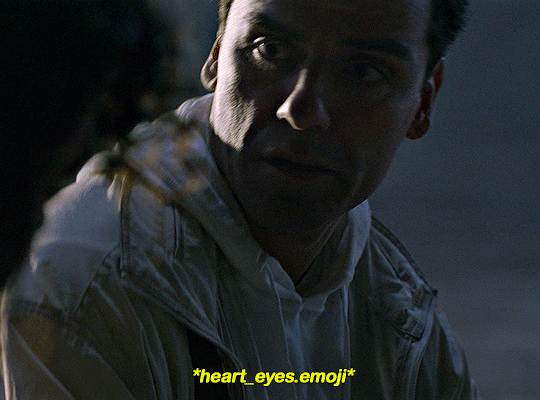
Summary: At an academic conference in USA, you meet an admirer of your work, Steven Grant of the University of London. But you seem to admire more than his work. Will this meet-cute between two people neck deep in their careers blossom into something more, or remain one of the nameless dozens you meet at every event? Maybe this time, you'll take a chance.
Writing based on prompt by @dopeqff
Warnings: Academia, dialogue-heavy
You stand at the line in the cafetaria, smiling politely at passing people you had met earlier in the day. It's your first time in the United States, and the first time presenting your research at a conference on this scale. It is a dream come true, as it is nerve wracking. And the man a couple ahead of you in line turning back again and again to glace at you is not helping. You wait for your order at the counter, tilting your chin up to reassert your confidence. Now it's just him ahead of you, you send a polite smile his way as you'd been doing to everyone.
He returns a tight lipped smile before he shakes his head and turns to you,"Sorry, but...I gotta ask. Are you Dr. ....did you write the paper of Ethnozoology of the Eastern Himalayas?" Your polite smile breaks into a genuine one at the recognition. "Yeah, that's me..hello!", you say with a tiny awkward wave. The man seemed to enamoured to note your shyness, and he rambled on excitedly,"It's so great to meet you! Your work, spending so much time with the community...wow! And the things you wrote about, and just...the way you wrote it, it's like reading a story, not a scientific paper...and I mean that in a good way..very good way!" You preen under the praises, mumbling thank you-s under your breath.
"Bollocks", he curses in a low voice. "I didn't introduce myself. My name's Steven Grant...with a V...research scholar in the department of History.."
"...University of London?", you finish his sentence and he nods, a bit baffled. "You wrote the piece on relevance of ancient Egyptian mythology to modern way of life" His eyes go wide at that,"You...have read it?"
"Oh yeah, thrice", you giggled, eyes shining. "It was insightful... relatable... emotional... and funny? The way you wove theories and literature with evidence, it was like poetry. Can't wait for more work from you!"
"I..umm..thank you", he is blushing quite vividly. The tips of his ears are red, and he bites his lip in a shy smile. He's attractive, but it's like he isn't really aware. Your eyes sweep his figure quickly. He's actually put effort into dressing for the occasion, in a formal shirt and dress pants and a tie, a pen tucked into his breast pocket. He was clean shaven and had these big, smart eyes framed by lines that highlighted his smile. With a head of dark curly hair lightly peppered with some grey, he was hands down handsome. But the way he carried himself wasn't the cocksure gait many men who looked as good followed. His stance is relaxed, peaceful. He cheerfully thanks the server who returns with your and his coffee order quite late.
"Actually I've been meaning to ask you some things about your work, I may be referencing some of your work in my next study", you pipe up when he hands you your drink. "I thought I'll mail you but never got around to...would you mind...sometime, if that's okay..?"
"Oh yeah sure!", he is beaming. "On ancient Egypt? I'll talk your ears off if'ya let me." That makes you chuckle, and you warn him,"I have to admit, I'm the same way about my work." You sip your coffee and look around the seating area. "If you're not busy now then, if you are though by all means..."
"No...no", he smiles, grabbing his wrap was just served. "Now is good." You both nod to each other glancing at an empty table and take your seats. There's an air of shyness between the two of you. You aren't an extroverted person by any means, but in professional settings you were almost never shy. But again, this wasn't a shyness that made you self conscious, or small. It made you feel seen, under doting attention that you weren't used to. He looks expectantly at you as you sip your coffee, and you ask him about his thoughts on development of philosophy in the middle eastern world as opposed to western culture. Soon that evolved to comparing notes and experiences from each of your on-ground experiences. Over another round of coffee, you told him stories from your stint in the Himalayas while he listened with rapt attention, gasping and sighing at the exciting bits. He was so attentive, so vocal, you were almost struggling to believe that he wasn't faking it.
"So...that's about it from me", you end sheepishly. "Long story short, take more alcohol with you than you think you'll need."
"You should write a book!", he sounds excited, earnest. "All these stories, I mean I thought your paper was great..and it is! But come on, a run-in with terrorists, living with hunters, local elephant gods, bears! It's like some Indiana Jones meets Jungle Book kinda..wow!"
"Yeah I doubt anyone's gonna want to read that", you laugh dismissively.
"They'd be missing out", he asserts like it's the most obvious thing.
"I have a question for you though", you change the topic. "Did you have a say in the art of God Khonshu that was published with your writing?" He hums in agreement,"Yeah, I gave the artist some basic descriptions."
"Right, okay!", you sounded excited. "How did you arrive at the descriptions...like, did you have any particular bird in mind..or do the texts...?"
"Not exactly", he shuffles in his seat, suddenly conscious, eyes quickly darting to a corner of the room and back. "It's a bit complicated, but you could say there were...multiple sources I triangulated from.''
You nod in understanding,"So yeah, I ask because it doesn't really match a bird? On the net it said falcon, or vulture, but the beak is way too big...You know what matches close though..well the beak isn't curved like his but..."
"What is it?"
"A Marabou Stork", you almost giggle. "Wait I'll show you" You fish out your phone, quickly type and hold it out for him to look at a photo. Steven's looking at it for a moment, two, then he throws his head back in a laughter.
"That is accurate", he laughs. "Gosh even the expression, yeah he wouldn't be happy"
"You think I'll be at the receiving end of his 'wrath that he called real justice' now?", you ask, quoting his writing.
Steven recognizes the reference, eyes shining in pride,"Nah, you're good. His fist of vengeance would agree with you."
"Charming", you chuckle. "So hey, I need to head for my presentation, but can I have your number? ...In case I have more questions."
You stand to shake his hands then, his number saved on your phone, and he gives his own awkward little wave. As you head back, your heart is thrumming excitedly as if it knows something you don't.
#moon knight#steven grant x reader#moon knight x reader#steven grant#marvel moon knight#steven grant x you#professor!steven#colleagues meet n cute#academic tumblr
90 notes
·
View notes
Note
Hi Swan..... What does oldwood project consist of ?
hiiiiii sorry i've been on mobile all day and im just not going to type out a whole shpiel about this on mobile it sucks to do that.
Oldwood is my little big worldbuilding project consisting of the general premise of "Ages and ages ago, the kingdom of men and the kingdom of beasts were barred from cohorting because the reigning god the Weeper deigned it the natural order, men hunt beasts to sustain themselves, beasts hunt men to keep wit sharp. The weeper one day ceased any indication of being there so the kingdoms ignored its dogma and united, and things prospered. one day the weeper returned and saw this and was enraged by it, and in its fury struck the lands, creating an Enormous basin filled with massive, monolithic trees that swallow the sky, and the kingdoms are exiled into the forest."
[More under here]
The weeper's blow, however, left wells of aspects of its power remaining. these wells were found and discovered and they were adapted in various ways, the six of them, being flesh, love, ink, death, color, and iron. The developments led to the rise of the six houses, the houses of the surgeon, punished love, the tragic poet, the five deaths, the colored capitols, and the iron grate. [the names were derived from the titles given to certain areas of pompeii that were being excavated, i learned them ages ago at an exhibit and it was the foundation for everything.]
now the present is many thousands of years later, life has gone on, and people have learned to live in the forest of drowned joys, society has been basically established, and while the houses are not the Governing Bodies their leaders are incredibly prominent figures and their followers are typically very sworn to them, and the houses hold significant sway.
The house of the Surgeon is led by The Surgeon, a batfolk [of which are incredibly rarely seen in the forest, electing to live within the caves within the walls and beneath the basin that the forest is in] who was the runt of its litter, and always had a dubious fascination with meat, who was one of the people who was originally a part of the very first kingdoms who were actually exiled into the forest. it discovered the well of power of flesh, gaining an utter mastery over it incredibly quickly, using that to sustain itself over the years. it is one of the very, Very few people who remain who witnessed the very beginnings of the forest.
The house of Punished Love is led by the Punisher of Love, an enormous serpentfolk [who are also very rarely seen on account of the notably cool climate in the forest] who was scorned for her birth, left abandoned in the woods. she was taken in by someone else, who did not have any preconceived notions of her birth, who loved her for who she was. after his death she eventually discovered the well of love, her circumstances granting her a quick mastery of it similarly.
The house of the Tragic Poet is led by, as you can probably guess, the Tragic Poet, a large spiderfolk [once again, rarely seen, bugs are less frequently seen in the forest for the same reason as reptilian beastfolk, however they are more common than reptiles.] i'll admit i haven't developed it as much as the others but it would always write poetry, just writing and writing and writing, full to the brim of thought and finding the page its only solace. this naturally gave it easier control over the well of ink, that power granting one the ability to turn words to power.
The other three houses are a little more abstract with the heads of the houses.
The house of the five deaths is lead by five skeletons in coffins, inanimate but still very much alive, capable of communing with one another and with anyone who steps between all of them. Their background and motives are far less well known, all that's really known is that they were five very close knit people before they met their demises upon discovering the well of death, and they gather as many bones as they can.
The house of the Colored Capitols is led by the colored capitols, which are animate statues residing under obelisks in a city in a Much different clime, a sandy, stony town in a desert, all residing within a painting. One must don a veil before entering the painting, as gazing upon the colored capitols with unveiled eyes as one who comes from elsewhere will end you trapped within the painting. The colored capitols bicker between each other a lot about the origins of the painting with which they reside in, [and like everything else,] but it's generally agreed upon the prospect that there was a painter who found the well of color, used it to paint the painting, and was subsequently consumed by their work.
The house of the iron grate is led by the iron grate, or more specifically what resides Inside it. by far the most obscured of any information regarding its origin, there is a grate within a room in the bottom of the estate which is over a hole that leads into the ground. There is a ladder in the hole. If you stand on the grate, you can hear whatever is within whisper to you, if it deigns to. You will not remember what it says, what it sounds like, or anything of the sort, only what it wills. Sometimes, people are sent into the hole beneath the grate, if it is warranted. Those people do not ever return.
feel free to ask any other questions you have i have WAY more stuff this is just sorta the fundamentals ^_^
Here is the playlist for oldwood if you would like to listen to it!!!!!
in short

9 notes
·
View notes
Photo
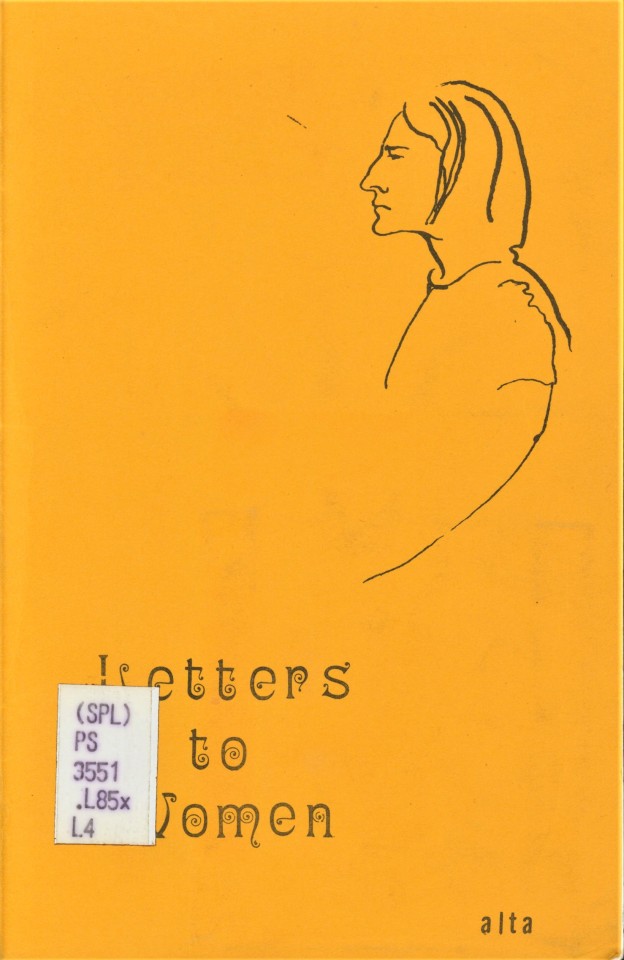
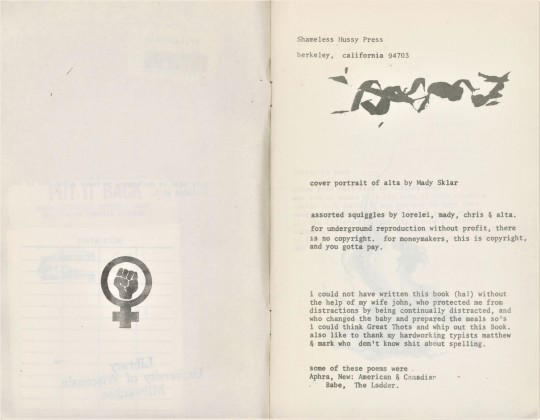
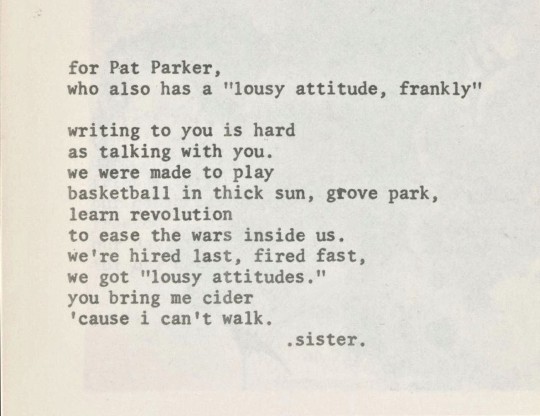
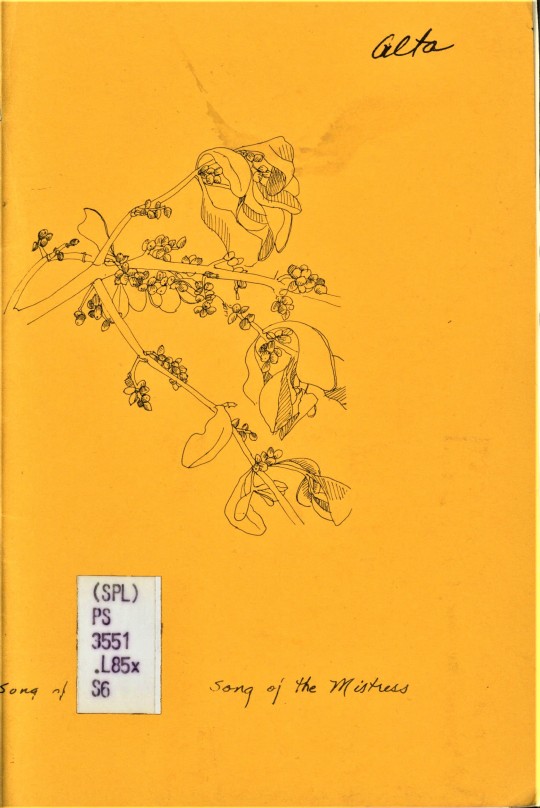
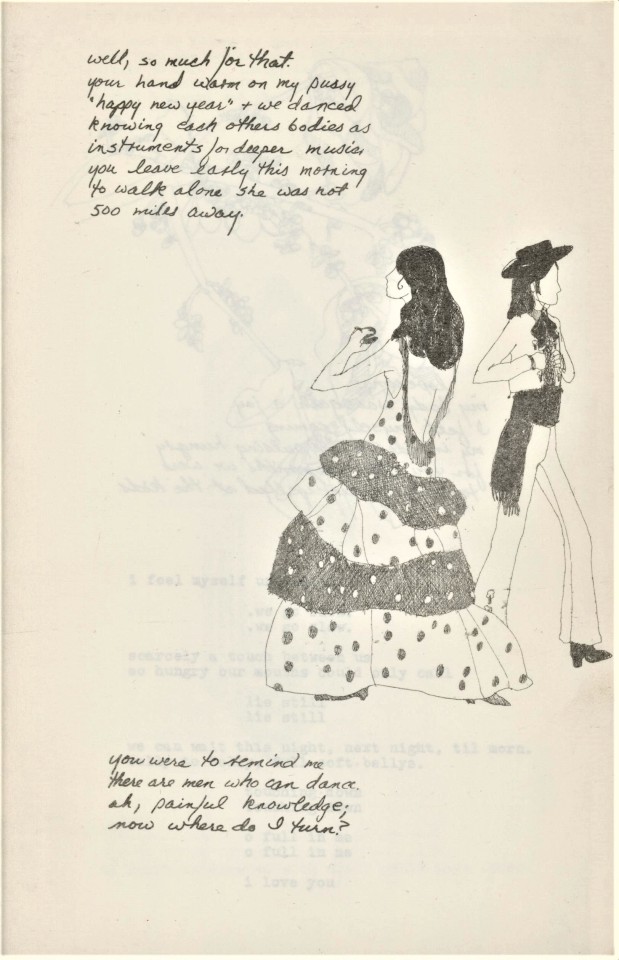
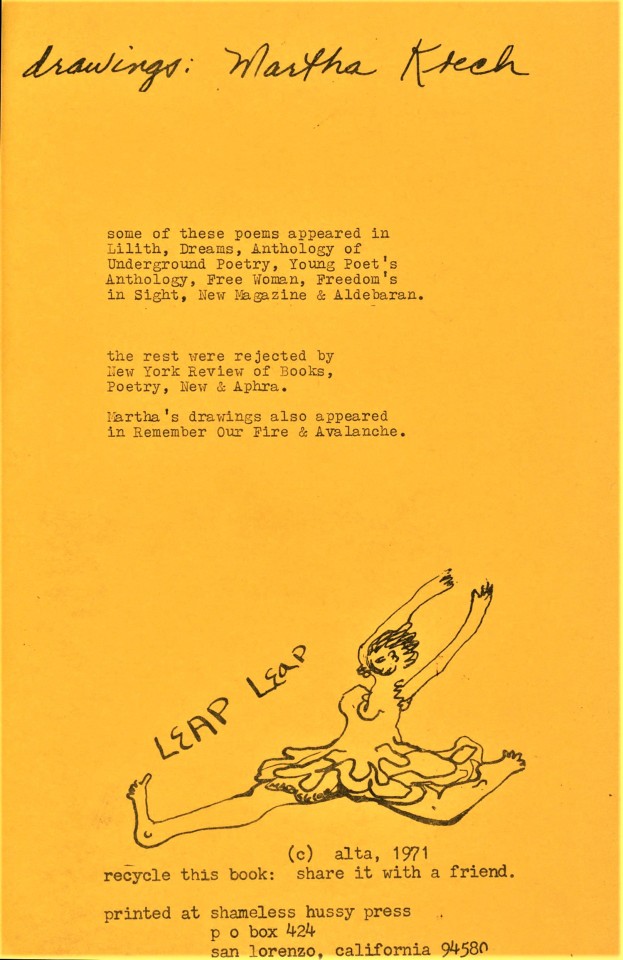
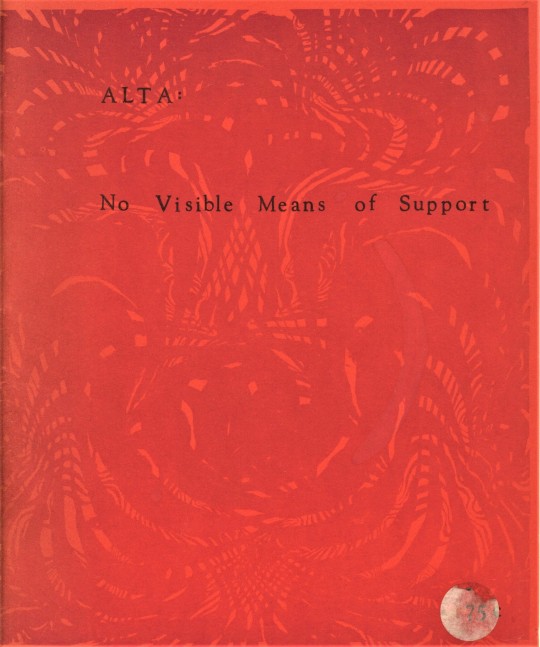
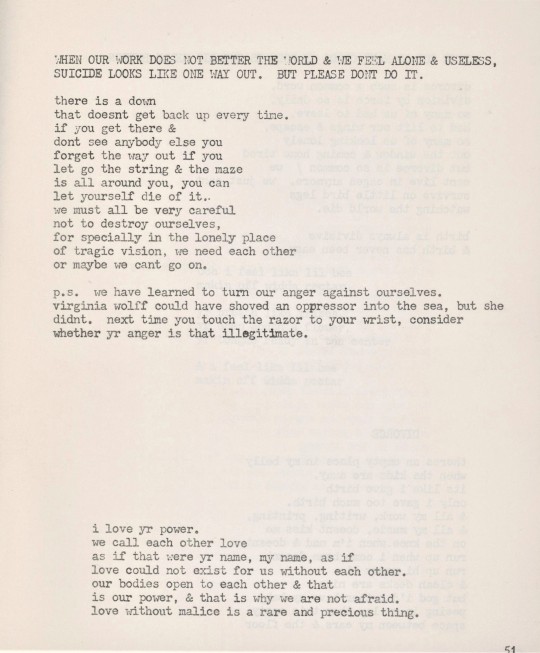
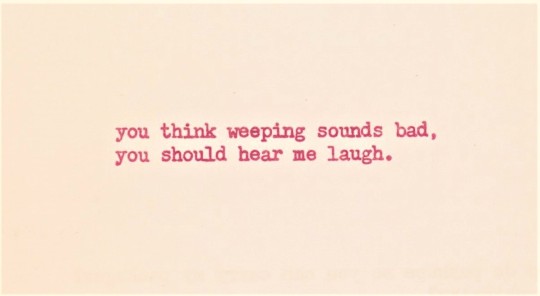
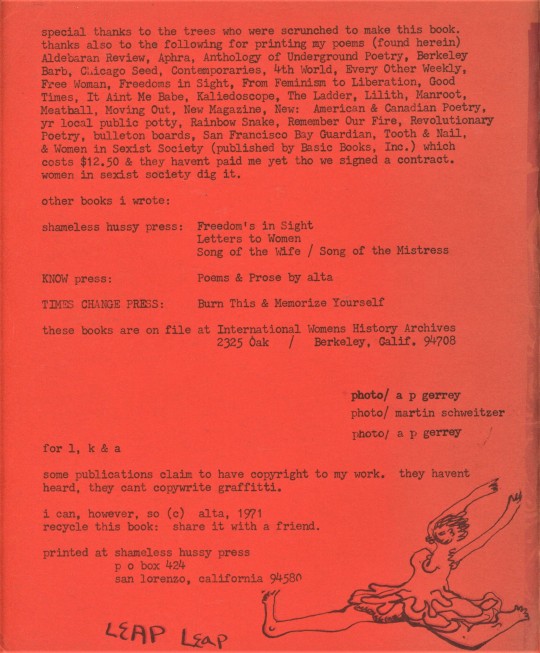
First Feminist Press!
Shameless Hussy Press
With the stress of Roe vs Wade potentially facing a repeal this summer, we want to let the women in our lives know they are not alone in their frustration. The fight women have been waging for their intellectual and bodily freedom has been a long one, so we wanted to revisit some history about the first women-owned feminist press in California, the Shameless Hussy Press! Poet and soon to be publisher Alta Gerrey founded the press in Oakland, California, in 1969, and would publish four women who later became prominent feminist writers: Pat Parker, Mitsuye Yamada, Ntozake Shange, and Susan Griffin. Alta published her own titles under her Shameless Hussy Press imprint, including three poetry collections preserved in our collection: Letters to Women, published around 1970; Song of the Wife; Song of the Mistress, published in 1971; No Visible Means of Support, published in 1971.
Alta’s sarcastic and straightforward writing style is reflected in the Shameless Hussy Press aesthetic. In her first collection, Letters to Women, she includes the iconic feminist symbol of a fist within the symbol of Venus and her copyright statement reads:
for underground reproduction without profit, there is no copyright. for moneymakers, this is copyright, and you gotta pay.
Alta emphasizes the aid of her friends and family in producing her book, and poetry aimed at letting women know that they were not alone in whatever injustices and hardships they faced, whether gender inequality and sexism, marriage and divorce, rape, mental illness, or raising children.
Alta’s second collection, Song of the Wife; Song of the Mistress, with drawings by Martha Kuech, reflects the intimacy the poet felt with her readers and how she used poetry as the outlet for emotions that could be a burden too heavy to carry at times. Letters to Women is dedicated “to every woman who is as isolated as i,” but Song of the Wife; Song of the Mistress "isn’t dedicated to anybody. eat yr hearts out.” Alta had a love for improper grammar, punctuation, and unconventional spelling. The first half of this second book reproduces a handwritten cursive script, presumably Alta’s handwriting, and the second half switches back to typewriter print. This title and Alta’s third collection, No Visible Means of Support, were both published after the Shameless Hussy Press had moved down the Bay to San Lorenzo, California, from its original location in Berkeley. Alta made the choice to move her independent press after the sabotage of a friend’s press in the same area, as well as to protect her daughter and herself from death threats she received for her work in the lesbian, feminist, and activist communities.
Shameless Hussy Press was the first to publish Ntozake’s Shange’s poetic performance work, For Colored Girls Who Have Considered Suicide When the Rainbow Is Enuf, which was later adapted into an Obie award-winning Broadway theater production. In 1976, Shameless Hussy published Camp Notes and Other Poems by Mitsuye Yamada, revolving around her experiences in the internment camps and the pain she felt at being perceived as an outsider.
The formation of the Shameless Hussy Press by Alta and the Women’s Press Collective by Judy Grahn, with aid from Pat Parker (who I posted about earlier), was quite inspirational for second wave of feminism. The four women who brought the feminist and lesbian publishing community to the foreground in California, Alta, Susie Griffin, Judy Grahn, and Pat Parker, had all met originally as neighbors over tea, but decided it was time to take action in their communities. Alta said in an interview that the group would often argue over how political their writing should be, wondering whether they should, “stick to the personal. [but] Susie kept saying, ‘the personal is political.’”
Griffin’s works were said to have launched ecofeminism in the United States as she rose to become one of the most influential American feminist writers of the 20th century. Alta’s Shameless Hussy Press gave these influential women the opportunity to be published outside the patriarchy of mainstream publishing, allowing them to completely claim their work as their own. Shameless Hussy ran from 1969-1989, despite being a one-woman-publishing house, publishing over fifty titles in its 20-y3qr existence.
–Isabelle, Special Collections Undergraduate Writing Intern
#Shameless Hussy Press#Alta Gerrey#Alta#Letters to Women#Song of Wife ; Song of Mistress#No Visible Means of Support#Judy Grahn#Feminist Press#Lesbian Poetry#Women's Press Collective#Pat Parker#Susie Griffin#Ecofeminism#Martha Kuech#Ntozake Shange#For Colored Girls Who Have Considered Suicide When the Rainbow is Enuf#Mitsuye Yamada#Camp Notes and Other Poems#Second Wave Feminism#Isabelle
29 notes
·
View notes
Text
Asian-White Book Recommendations
My father is French-Swiss while my mother is Singaporean-Chinese. I grew up in Singapore for the first 18 years of my life, and went to international schools the whole time. I had never thought about my heritages or cultures much (though I cannot tell if that's a product of being young or growing up in a place that understood my mix). When I moved overseas to Canada for university last year, I felt confronted by race and perceived differently by others for the first time. Everyone was mixed where I came from, but now none of my roommates had ever had a bubble tea or raclette in their lives.
Ever since then, I have been slowly reflecting on my identity. Over the course of the past year I have sought out and read books (both fiction and non-fiction) from other Asian/White mixed authors to help me understand myself and my feelings. Here, I have compiled a small list of the best books I have read so far dealing with being mixed.
Older Sister, Not Necessarily Related by Jenny Heijun Wills
Though not technically mixed, Wills is Korean but was adopted by a Canadian family and grew up in North America. Most chapters don't run for more than a couple pages and read almost like poetry with the lyrical and metaphoric language. Reuniting with her Korean parents as an adult, Wills details the painful emotions of feeling like you don't belong to either culture you are from -yet yearning to be accepted as a 'true' citizen of both.
Minor Feelings by Cathy Park Hong / The Loneliest Americans by Jay Caspian King
I am grouping these two memoirs together because of their similar topics and because I read them in close succession. Discussing being Asian-American, Hong and King also delve into the history of Asian immigrants in the United States and the community's evolution over the decades. I found the authors very angry and aggressive in their writing, but I have also not experienced the level of discrimination they have gone through as I grew up in Asia.
Parachutes by Kelly Yang
The only fiction book on this list, Yang tells the story Claire Wang who is sent from her home in Shanghai to attend a high school in the United States alone. Moving to Canada for university, I found myself relating to this YA novel a lot more than I had expected. How people around me treated me differently because I was an international student and the 'Crazy Rich Asian' lifestyle they assumed I have. The difficulty of trying to make friends with local students; finding myself gravitating to other Asian international students.
Small Bodies of Water / Tiny Moons: A Year of Eating in Shanghai by Nina Mingya Powles
Two books by the same author. Powles is the author I have enjoyed reading the most out of everyone on this list. She weaves her thoughts on being mixed (Chinese-Malay and New-Zealander) into stories exploring other themes: Small Bodies of Water is a collection of essays about her relationship with water, while Tiny Moons details the food she ate during her year abroad in Shanghai. Powles put into words my frustration at not being able to speak Chinese (my mother's language) while also celebrating the different cultures she comes from.
Seeing Ghosts by Kat Chow
Much more of an exploration of grief with Chow writing about her mother's death. This was the first book I read where the author also called her grandfather the same name I call mine - Gong Gong. A deeply moving book, it deals with Asian families; the hurt and love they give you.
If you have any recommendations for books on being mixed, please send them my way! I am especially looking for books that are about other countries than the United States (as I have found I relate less to Asian-American experiences than other Asian-White countries/cultures).
#asian#asia#book rec list#asian literature#book recommendations#english literature#literature#asian american#wasian#mixed race
4 notes
·
View notes
Text
Everything Can Be a Center: Mini Interview with Ae Hee Lee
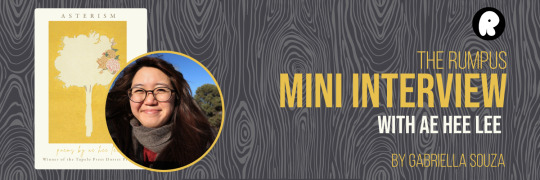
by Gabriella Souza
The collection Asterism:Poems (Tupelo, 2024) traces the three prongs of poet Ae Hee Lee’s national lineage. Born in South Korea, raised in Peru, and now residing in the United States, Lee uses this inquiry as the backbone of her collection, which was also the 2022 winner of the Dorset Prize. She slips between lyrical and narrative and draws on snippets of languages and scenes to illustrate the scattered, displacing experience of existing between countries and cultures. The connections she draws that cross time and space center us in Lee’s experience of making home wherever she is.
Lee and I spoke over Zoom this winter, where we discussed how she began writing in English, the multi-national history of the Peruvian dish Lomo Saltado, and the “play” aspect of poetry.
***
The Rumpus: So much of this collection is about how people, places, objects, even food, form our identities. I was struck by the poem, “Self-Portrait as a Mother,” particularly the line about how your mom taught you to be a foreigner.
Ae Hee Lee: That poem came to me really slowly. I didn't have that kind of understanding until much later, after living years in the United States and wondering, Where did I learn to live as a foreigner but at the same time as someone who doesn’t let the world around me exclude and fix me in an outsider position. And I realized, it must have been when watching my mother’s life in Peru as a Korean migrant. She didn’t let things get to her, and I think that attitude translated into my own life. I wanted to highlight and remember that strength in “Self-Portrait as a Mother,” but there were other things too.
In Trujillo, my hometown, we didn't really have a Korean community. My mother felt very lonely and, at the same time, scared. Everything was unfamiliar to her. She had a nervous energy to her and could also get overprotective. That was something that I also took when I came to the US, that feeling like I always had to be prepared, ready for anything, because I don't know this place.
Our identities are not really as individual or independent as we think. They're interrelated with other people's lives. Even strangers might have left deep impressions on us that we’re not wholly conscious about. So, I thought to write self-portraits, but as other people, how they are a big part of who we are.
Rumpus: How did you start using poetry to explore identity?
Lee: When I was a child, I wrote poetry in Spanish because I lived in Peru, and it was for school. A lot of it was persona poetry or retellings of fairy tales. When I came to the States, I studied literature in college. I was trying to find ways that I could process the world around me, and that's probably why I started writing about myself. I still wrote retellings and persona poems, but it was much more closely tied to my own experiences. I was trying to understand this new country. Not only the culture, but also the people and the conversations I was having. The systems were particularly shocking to me, all the procedures that I had to go through to “belong” in this country. Writing was a way of not just surviving, but living, too. It gave me a sense of agency that was lacking especially in that transitional period in my life.
Rumpus: Your form is quite varied throughout this collection. When does form come about for you in your writing process?
Lee: I enjoy the play aspect of poetry. We talk about pushing boundaries, but really, the wonderful thing is that poetry has no boundaries; they are all constructed. When I write, I want to explore everything. Even with a given poem, I'll write it in one form, then I'll try it in another and another. I'll have the same poem in five different forms. This is a way for me to converse with the poem. I feel like the poem is what leads me, rather than me taking control of what it should be. I’m offering it ideas, like I'm saying, “What about this?” And the poem tells me, “Yes, this feels nice. Cozy.” And I'm like, “Yeah, that looks good on you.”
Rumpus: How do you experiment with language when you're determining what form the poems will take?
Lee: There were a lot of instances when I would write a poem in English and use a specific phrase and then when I’d show it to others or workshop it, people would point out that the phrase is actually a cliche in the States. I had thought I was being so creative, because I came up with this marvelous thing, only to find out it was overused in English. Those moments were surprising and at the same time, rather amusing. It made me interested in the processes behind our thoughts and how we try to understand and express the world. With Spanish and Korean, there are many interesting idioms or ways of expressing things that sound strange when translated to English, but they also reach a mysterious truth and resonate with people even if they're not familiar with it.
I enjoy those gaps between what feels familiar and what does not. I view them as invitations to connect the cultures and languages in my life, which I find to be an act that de-centers the US and English from a position of exclusive relevance. When writing Asterism, I didn't want to only write about the States and have the entirety of my experiences orbit around my current life in this country. That’s one of the reasons why the title is Asterism. I aimed for a poly-centric perspective, instead of one that just has this one center and therefore has everything else lying in the margins. Everything can be a center if we let it. It’s the same with language. That’s why there are a couple of moments where I don't translate or sneakily mistranslate.
Rumpus: That's interesting because we're talking about what makes up someone's identity, and you investigate what makes up a word's identity. I’m thinking about how you use the objects, including food, in your poetry as ways of remembering or being, like in the poem “Self-Study Through Daily Sustenance.” How do you consider objects in your poetry?
Lee: With that poem and a lot of other ones, I usually write fragments around a subject or object of interest in a notebook. The fragments lead me to other fragments. When I sit down and read through them, I start to see patterns. I really enjoy the process of following these breadcrumbs and stars. If I decide on the destination from the get-go, then I feel like I'm limiting myself.
For instance, growing up, I always thought it was interesting how Lomo Saltado, which is a classic Peruvian dish, uses soy sauce as its main base. I wasn't like analyzing it profoundly, but I did think about how soy sauce originated from Asia. Later, I found out that Chinese immigrants in Peru, who had started establishing their own restaurants in the nineteenth century, had caused a fusion in the cuisine that eventually led to the creation of the Lomo Saltado as we know it. And what I'm experiencing with the dish that I'm eating is all of that history. It felt so wonderful that I was, in a sense, part of that tradition, and how what I cook here in the States with the ingredients that I have at my disposal may contribute to that as well.
Rumpus: Who do you read for inspiration?
Lee: Ilya Kaminsky's Dancing in Odessa was eye-opening for me and showed me I could also write about somewhere else that wasn’t the US. Theresa Hak Kyung Cha’s intertextuality and multilingual approach to writing were inspiring. Bhanu Kapil’s Schizophrene and Alberto Ríos’ A Small Story about the Sky were some other collections that stayed with me as well. Recently, I've been reading a lot of nonfiction. The most recent one was Conditional Citizens by Laila Lalami.
Rumpus: How does reading nonfiction inform your process? And are you ever tempted to write nonfiction?
Lee: I process things through poetry. When I’m reading non-fiction or fiction, I find poetry in between the lines. Sometimes reading poetry makes us reply back in prose. We see this in reviews, essays, or analysis about poetry books. But personally, when I read prose, I have an instinctive reaction to reply with poetry.
I was a fiction reader when I was a kid, so I thought I would take the path of fiction, but every time I wrote, I stopped at each word. I was so slow. That slowness, I realized, was important to me. It might be because different languages are a part of my life that I keep wanting to translate or analyze what each of the words in each of the languages were doing. I kept going into rabbit holes. And all of them led me to poetry.
***
Gabriella Souza is a Portuguese-American writer whose work has appeared in North American Review, The Adroit Journal, The Rumpus, New South, and the Best Small Fictions 2022 anthology, among others. She has received fellowships and scholarships from Disquiet International, The Community of Writers, and the Virginia Center for the Creative Arts and won the 2020 San Miguel Writers’ Conference Writing Contest. She received her MFA in creative writing from Antioch University Los Angeles, where she was the recipient of an Eloise Klein Healy Scholarship. She lives in Baltimore with her husband, a dog, and two cats.
0 notes